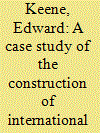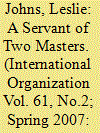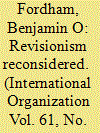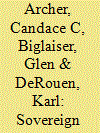|
|
|
Sort Order |
|
|
|
Items / Page
|
|
|
|
|
|
|
| Srl | Item |
| 1 |
ID:
077454


|
|
|
|
|
| Publication |
2007.
|
| Summary/Abstract |
This article evaluates different theories of hierarchy in international relations through a case study of the treaty system that the British constructed in the early nineteenth century in an effort to abolish the slave trade. The treaty system was extraordinarily wide-ranging: it embraced European maritime powers, new republics in the Americas, Muslim rulers in northern and eastern Africa, and "Native Chiefs" on the western coast of Africa. It therefore allows for a comparative analysis of the various types of treaty that the British made, depending on the identity of their contracting partners. The article argues that a broadly constructivist approach provides the best explanation of why these variations emerged. Although British treaty-making was influenced by the relative strength or weakness of the states with which they were dealing, the decisive factor that shaped the treaty system was a new legal doctrine that had emerged in the late eighteenth century, which combined a positivist theory of the importance of treaties as a source of international law with a distinction between the "family of civilized nations" and "barbarous peoples
|
|
|
|
|
|
|
|
|
|
|
|
|
|
|
|
| 2 |
ID:
077452


|
|
|
|
|
| Publication |
2007.
|
| Summary/Abstract |
International bureaucrats must often serve multiple principals who collectively choose policy. How does this affect bureaucrats' incentives to truthfully reveal their private information? I construct a cheap talk model in which a bureaucrat possesses private information about how policies translate into outcomes. The bureaucrat can communicate publicly observable messages about this information to two policymakers, who must then bargain over a set of policy choices. I find that both the bureaucrat's willingness to communicate informatively and the choice of an optimal bureaucrat are highly contingent on the bargaining powers of the two policymakers. When each policymaker is bound to adhere to the bargaining outcome, "moderate" bureaucrats are most preferred. In contrast, when at least one policymaker can leave the bargaining table and exercise an outside option, "biased" bureaucrats can be optimal. I illustrate my findings by examining UN weapons inspections in Iraq from 1991 to 2003.
|
|
|
|
|
|
|
|
|
|
|
|
|
|
|
|
| 3 |
ID:
077295


|
|
|
|
|
| Publication |
2007.
|
| Summary/Abstract |
In this article I investigate the apparent tension between liberal theories that highlight the foreign policy benefits of domestic accountability and the observation that the public tends to reflexively support a leader during an international crisis. Previous theories of the process by which the public rallies around their leader tend to highlight the emotional and automatic nature of citizens' responses to threats. Using a simple signaling model, I show that the political and operational circumstances that increase the probability of post hoc verification and punishment for privately motivated policy enhance the credibility of a leader's choices and transmit information on the benefits of action to the public. I derive several observable hypotheses from the informational model, linking the costliness of the signal, the presences of divided government, election years, active term limits, political insecurity, changes in freedom of information laws, and trust in government to the size of the rally in the United States. A battery of empirical tests offer strong support for the informational model and suggest that a public rally is a rational response to numerous international crisis circumstances. Observing a rally need not imply an emotional or irrational public
|
|
|
|
|
|
|
|
|
|
|
|
|
|
|
|
| 4 |
ID:
077456


|
|
|
|
|
| Publication |
2007.
|
| Summary/Abstract |
In this article I examine how a weak international law can be created despite the presence of a strong norm, and I use weak law to probe the relationship between social and legal norms. International law dealing with mercenaries is notoriously flawed. These flaws have been attributed to the idea that state interest (or lack of interest) led to the development of intentionally weak law. In fact, ineffective anti-mercenary law is the result of the influence of norms. A strong norm against mercenary use has led states to devise a definition that indicated what they found problematic about mercenaries, and differentiated mercenaries from other actors. This definition followed the anti-mercenary norm but created a number of loopholes, which were made worse by the fact that commitment to the norm was so strong that states were unable to make adjustments necessary to create more effective law. The development of the law against mercenaries was further undermined by the pressures of a competing norm. During the 1980s, creation of a UN Convention to deal with mercenaries was stymied by the fact that many states were seeking to protect the norm of state responsibility, and the conflict between this norm and the anti-mercenary norm delayed the Convention to such a degree it was superseded by events. Weak anti-mercenary law, created in the presence of a strong anti-mercenary norm, can demonstrate four things about the relationship between social and legal norms: that states advocate the creation of law because of what it is rather than what it does; that legal institutionalization is not necessarily good for the further development of a norm; that strong commitment to a norm can lead to the creation of weak law; and that social and legal norms might not differ because the latter is more effective
|
|
|
|
|
|
|
|
|
|
|
|
|
|
|
|
| 5 |
ID:
077457


|
|
|
|
|
| Publication |
2007.
|
| Summary/Abstract |
One of the most important developments in the world economy during the past three decades has been the willingness of governments in emerging markets to liberalize controls over international capital movements-a process known as capital account liberalization. What accounts for this trend? While existing research highlights a number of important factors, it neglects the role played by the rise and spread of neoliberal ideas that prioritized liberalization as a policy choice. Extending the literature on epistemic communities, I argue one critical mechanism shaping policy decisions is the formation of a coherent team of neoliberal economists. Using a new data set that codes the professional training of more than 1500 policymakers in emerging markets, I assess the relative importance of this argument quantitatively on a sample of twenty-nine emerging markets from 1977 to 1999. In order to assess the independent effect of neoliberal economists, I also take into account the endogeneity of the appointment process, assessing whether appointments are driven by credibility concerns, political interests, or economic conditions. I also stress that a fuller understanding of the appointment process necessitates a focus on the social environment in which appointments are situated
|
|
|
|
|
|
|
|
|
|
|
|
|
|
|
|
| 6 |
ID:
077453


|
|
|
|
|
| Publication |
2007.
|
| Summary/Abstract |
Why did the United States intervene in World War I, breaking with its long tradition of noninvolvement in European political and military conflicts? During the 1920s and 1930s, many "revisionist" historians argued that American efforts to protect its trade with the Allies ultimately led to intervention. The logic of the revisionist position closely parallels the contemporary liberal case that interdependence promotes peace but arrives at different conclusions about the relationship between trade and conflict. Historians have largely abandoned this economic interpretation of American intervention, but data on the impact of the wartime export boom on the United States suggest that it should be reconsidered. The export boom was so large that it would have been difficult to ignore, and its progress corresponds to the timing of important decisions leading to American belligerency. An analysis of congressional voting on war-related measures also suggests that export income helped shape politicians' views of the war
|
|
|
|
|
|
|
|
|
|
|
|
|
|
|
|
| 7 |
ID:
077455


|
|
|
|
|
| Publication |
2007.
|
| Summary/Abstract |
The importance of sovereign bond ratings has grown recently as assessments by credit rating agencies (CRAs) influence the cost of capital. Understanding how CRAs determine country ratings is difficult based on the secretive nature of these agencies. Controlling for the common explanations in the literature, we use panel data and interviews to investigate the role of the "democratic advantage" and other determinants on bond ratings set by Moody's Investor Services, Standard and Poor's, and Fitch Ratings for fifty developing countries from 1987 to 2003. We find that regime type and most other political factors have little effect on bond raters. Instead, trade, inflation, growth, and bond default strongly affect sovereign ratings. The message for policymakers in developing countries is that factors that support bond repayment are most useful for enhancing CRA ratings
|
|
|
|
|
|
|
|
|
|
|
|
|
|
|
|
|
|
|
|
|